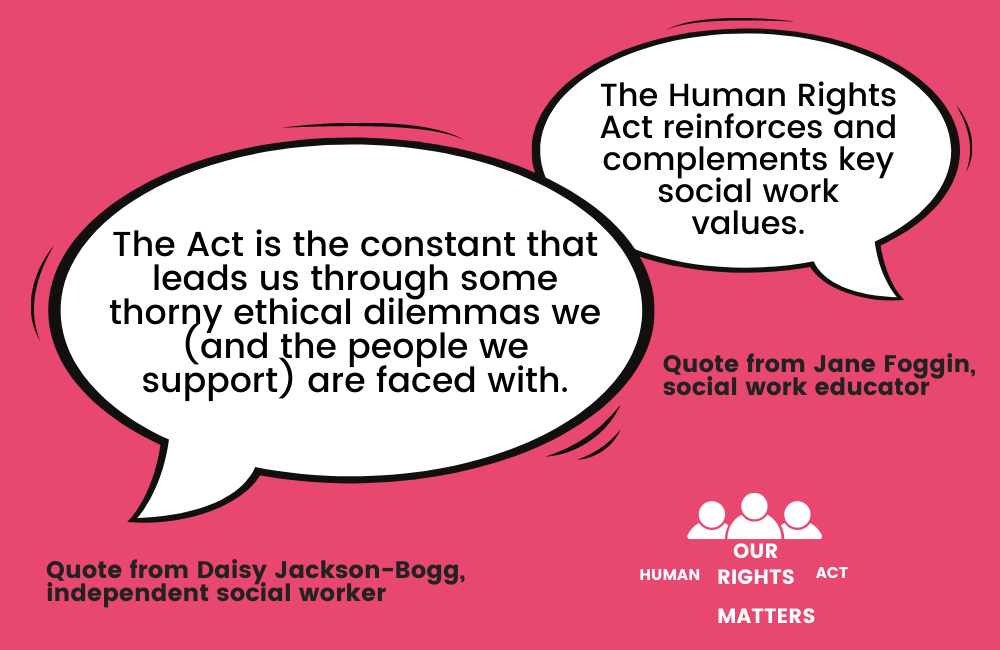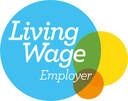Daisy Jackson-Bogg is a member of the British Association of Social Workers (BASW), an independent social worker and Director of DCC-I, an independent social work consultancy and Continuing Professional Development (CPD) organisation. Daisy is a practicing Approved Mental Health Professional and Best Interest Assessor, undertaking independent assessments and Serious Adults Reviews work alongside developing and delivering CPD for the health and social care sector.
Is it important to, or important for? A key question in strengths-based practice, an approach which is upfront and central in the part of the profession I occupy, adults and mental health. This is a question I can ask, and know to ask, because of the influence of the Human Rights Act. Without it, social workers, independent or otherwise (along with other health, social care and public sector colleagues), would still be making unilateral decisions based on what they believed was most likely to keep people safe, guided by what the moral majority thought was best (translated at points in our history as almost ‘warehousing’ people who didn’t fit the norm or who were seen as broken, weak or less than, those who were seen as not being able to ‘make a contribution’ to the society in which they live. Whilst I agree in general terms that safety is a positive and important aspect of both civil life and specifically social work practice within that. I also recognise that it is a subjective term, one that varies according to the individual, context, and choices available. There is a balance to be struck between what society believes is best, and what the individual may want and/or need, and this is the position that adult social workers occupy on a daily basis. For many of the people we work with, their view of the world is not the same as our perceptions as workers, or our health colleagues’ perceptions, or the perceptions of the wider society (including the press at some points!). We know that one persons’ safety can be another person’s worst fear, and without a framework to underpin our decision-making, social work responses would have no benchmark, no consistent way of navigating thorny dilemmas and would likely have limited consistency – based on the issue, the context, the players involved and the values of the practitioner rather than a sense of fairness, respect, equity, dignity and autonomy (aka the FREDA principles, the key principles that underpin social work practice overall). While many would argue this is the case anyway (which I can’t deny in general terms, we don’t always get it right and people are not always acting with positive intent), what I believe we do have is a common understanding of how the state should support its citizens, and a mandate which requires us, as professional social workers, to intervene and challenge when individual or community rights are being interfered with or otherwise eroded. For me the Act is the authority that the profession rests, and relies upon, to deliver both our statutory and non-statutory duties, often without knowing that this is the case. For me, social work sits on that boundary between the benefit of the many versus the benefit of the few / individual. We are both advocates for individual rights and, in some cases custodians of both individual and public safety. It’s a sharp double edge sword that we walk on, and for me, the Act is the constant that leads us through some thorny ethical dilemmas we (and the people we support) are faced with, often whilst managing conflicting demands, shocking resource deficiencies and subjective interpretations of need and risk. As an AMHP and BIA it is the cornerstone of practice, the very reason my role exists, it is the roots of professional social work practice, ever present but not always noticed. Daisy Jackson-Bogg 8th December 2021 Comments are closed.
|
AuthorSNews, views and rambling rants from the DCC-i Crew... Archives
September 2022
Categories
All
|
|
DCC Interactive Ltd
Registered Office: 22 St John St, Newport Pagnell. MK16 8HJ Registered in England & Wales, Registration No: 13075266 Contact: [email protected] Registered with the Information Commissioners Officer, Registration No: ZA839281.
|
Our Accreditations: |



 RSS Feed
RSS Feed





